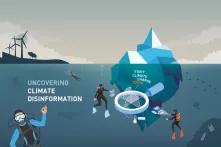In this super election year, concerns loom over how artificial intelligence might impact elections worldwide. Technology’s advances, coupled with the potential misuse of bad actors, are a real threat. However, there are intriguing contrasts in attitudes towards AI and the use of technology between Europe and the Global South. Prof. Dr. Payal Arora, Chair of Inclusive AI Cultures at the Department of Media & Culture Studies at Utrecht University, challenges prevailing narratives of techno-pessimism. She offers a nuanced perspective on the transformative potential of technology within inclusive frameworks. Zora Siebert asked her three key questions.

Why do people in Europe suffer from pessimism paralysis – a fatalistic view towards AI innovations?
Europeans, especially from Southern and Eastern blocs, are increasingly getting pessimistic towards AI partly due to the fact that they are an ageing demographic, prone to nostalgia of the past and fear of the future. Worth contrasting this to the opposite trend taking place in South Asian and Sub-Saharan countries, where more than half their population are below the age of 25 and consistently rank top in their optimism towards AI. It is simplistic though to dismiss this as a mere generational mindset of technophobia and techno-pessimism. Europeans do indeed have reason for concern. They enjoyed an extended period of peace and prosperity over decades, with a rare solidarity across countries and cultures to build a thriving region of liberal democracy. Today, big tech driving AI threatens to disrupt information integrity through for instance deepfakes, and that in turn can negatively impact trust in each other and our institutions. However, many in mainstream media and academia have committed themselves solely to doomsday discourses, leaving little room to show how AI, with the right guardrails, can also be a powerful tool to help us address our most confounding of global challenges.
How can we reimagine the digital space in a positive way?
We don’t need to reimagine. We just need to re-engage with the Global South, the majority world, if we are to find hope. Anyone who has stepped outside the West and gone to Brazil or Kenya will feel the positive energy of the youths as they desperately want to opt in, not out of the digital. Namibian youth can confront the elderly political leaders on their policies online, which would rarely happen when face to face. Iranian activists circulate deepfakes of women without hijabs kissing in public to get their messages for freedom through in a safe manner. ‘Housewives’ in India report how they feel seen finally as they sell sarees on Facebook live to their customers. Ugandan gays surreptitiously get together to find companionship online with the passing of the anti-gay bill. I could go on. The thirst for self-actualization drives this optimism towards AI. Technologies, despite the risks and harms, have been their friend. The West takes this for granted and forgets that less than 7% of the world’s countries enjoy liberal democracies. I hear time and again how mere self-actualization is trivial compared to the fate of our democracy. What we fail to realize is that self-actualization is in fact the cornerstone of democracy.
What can the EU learn from feminist digital activists and women's collectives in the Global South?
Many women in the Global South face the double discrimination of the pay gap and the digital divide. Often, they have little autonomy over their choices in who they love or what they can be. And yet, despite or perhaps because of these sticky cultural challenges, women collectives speak up and stand at the frontlines to demand change. What may seem mundane or humble is often a radical act. Wearing lipstick in Afghanistan or strolling alone in a park in India is an act of courage. We can learn from such courage – understanding that it’s in the everyday acts of joint defiance that shifts the needle. This is exactly what we need to do, one step at a time, to piece together what we love the most – be it a trustworthy media, an accountable tech industry, a more tolerant and compassionate society, a healthy planet.
The views and opinions in this article do not necessarily reflect those of the Heinrich-Böll-Stiftung European Union.

